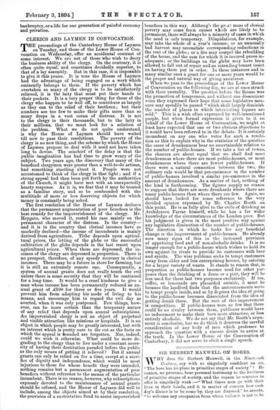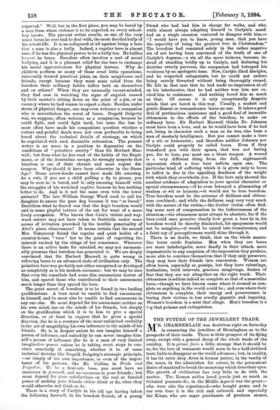SIR HERBERT MAXWELL ON BORES.
WHY does Sir Herbert Maxwell, in the Nineteenth Century, say with so singularly confident an air, "The bore has no place in primitive stages of society"? He cannot, we presume, bear personal testimony to the liveliness of primitive stages of society, and the reason he ventures to offer is singularly weak :—" What times men go with their lives in their hands, and it is matter of concern how each day's dinner is to be come by, they are disposed," he asserts, "to welcome any companion from whom violence is not to be
expected." Well, but in the first place, you may be bored by a man from whom violence is to be expected, as every school- boy knows. The present writer recalls, as one of the very worst bores he ever had to deal with, the most decided bully of his school-life. It is no safeguard at all against being a bore that a man is also a bully. Indeed, a regular bore is almost sure, if he has the physical power, to be a bully too. He bullies because he bores. Boredom often involves a sort of moral bullying, and it is a pleasant relief for the bore to exchange his moral oppressiveness for physical torture. Why do children perform so many of those cruel little operations, innocently termed practical jokes, on their neighbours and friends, except because they want some relief from the boredom their ordinary habits inflict both on themselves and on others? When they are unusually vacant-minded, they find ease in watching the signs of anguish caused by their master's sitting down on the point of a pin, or on vacancy where he had reason to expect a chair. Besides, under stress of physical danger, one may even welcome a companion who is nevertheless the worst of bores. Dugald Dalgetty was, we suppose, often welcome as a companion, because he could fight, and could fight hard, but none the less he must often have made his companions question whether a violent and painful death were not even preferable to being bored about the technical details of strategy, on which he expatiated with such damnable reiteration. The present writer is no more in a position to dogmatise on the conditions of "primitive society" than Sir Herbert Max- well ; but from what he has read of the habits of the Esqui- maux, or of the Australian savage, he strongly suspects that boredom is one of their chronic and most urgent dis- tempers. Why should it have been otherwise in the Stone Age? Stone arrow-heads cannot have made life amusing. As a rule, if you see a child pulling a fly to pieces, you may be sure he is bored, and is only amusing himself with the straggles of his wretched captive because he has nothing better to do. And is it not the same even with the lower animals? The late William George Ward used to call his daughter to amuse the poor dog because it was "so bored." Doubtless what he feared was that the dog's boredom would end in some playful torture of the cat for want of a more lively occupation. Who knows that Cain's violent and way- ward nature may not have taken to fratricide under some access of irritation provoked by the terrible punctuality of Abel's pious observances It seems certain that the second Mrs. Tanqueray found the regular and quiet habits of a country-house, " bore " her to the point of regretting the interest excited by the stings of her conscience. Wherever there is an active taste for mischief, we may not unreason- ably presume that boredom has generated it. We are deeply convinced that Sir Herbert Maxwell is quite wrong in referring bores to an advanced state of civilisation only. The primitive bore was probably not either recognised or developed as completely as is his modern successor ; but we may be sure that even the cannibals had some dim unconscious horror of him, and spared those who contributed to their amusement much longer than they spared the bore.
The great secret of boredom is to be found in two leading qualifications. A bore must be unable to find amusement in himself, and he must also be unable to find amusement in any one else. He must depend for his amusement neither on his own mind, nor on the minds of his friends, but simply on the gratification which it is to him to give a special direction, or at least to suppose that he gives a special direction (for he is a creature of the most unlimited credulity in the art of magnifying his own influence) to the minds of his friends. He is in despair unless he can imagine himself a person of influence, and unluckily he can never imagine him- self a person of influence (for he is a man of very limited imaginative power) unless he is taking overt steps to con- vince somebody of something, whether it be of some technical doctrine like Dugald Dalgetty's strategic principle, —or simply of his own importance, or even of the impor- tance of his patrons, like Mr. Collins, in Pride and Prejudice. To be a first-rate bore, you must have no resources in yourself, and no resources in your friends ; but must depend for your satisfactions on the real or fancied power of making your friends either think or do, what they would otherwise not think or do.
There is a story of Carlyle in his old age having taken the following farewell, in his broadest Scotch," of a young friend who had had him in charge for walks, and who, while almost always adapting himself to Carlyle's mood had on a single occasion ventured to disagree with him,— " I would have you to know, young man, that you have the caparcity of being the greatest bore in Christendom." The boredom had consisted solely in the rather negative sin of not having been convinced of the truth of one of Carlyle's dogmas,—a sin all the more heinous, because, in- stead of standing boldly up to Carlyle, and declaring his doctrine utterly perverse, the companion had betrayed his weakness by an apologetic tone. Now, Carlyle liked disciples, and he respected antagonists, but he could not endure being merely thwarted without being thoroughly roused. He felt in that case that he had made no impression at all on his interlocutor, that he had neither won him nor ex- cited him to resistance. And nothing bored him so much as that. Of course it is only exceptionally despotic minds that are bored in this way. Usually, a modest and gentle dissent or remonstrance bores no one. It takes a good deal of pertinacious insistence and a good deal of incurable obtuseness to the effects of the boredom, to make an ordinary bore. Sir Herbert Maxwell thinks Dr. Johnson must have been a bore, and so he would have been if he had not, being in character such a man as he was, also been a man of masterly intelligence. But you cannot make a bore of a wit or humourist ; and therefore neither Johnson nor Carlyle could properly be called bores. Even if they transfixed you with their spears, that was not boring you, for to bore, you must use a blunt weapon. A wound is a very different thing from the dull, nightmarish oppression which a true bore inflicts upon one. The particular kind of suffering which it is given only to bores to inflict is due to the appalling deadness of the weight with which they overwhelm you. If the bore only showed the smallest evidence of adaptation to your special character or special circumstances,—if he even betrayed a glimmering of wisdom or wit or humour,—it would not be true boredom. True boredom must be the outcome of dullness and obtuse- ness combined; and while the dullness may vary very much with the nature of the victim,—the livelier victim often find- ing some sort of compensation in the ludicrousness of the situation,—the obtuseness must always be absolute, for if the bore could once perceive clearly how great a bore he is, his boredom would be thereby diminished, his opaqueness would not be complete,—it would be raised into translucence, and a faint ray of perceptiveness would shine through it.
There is no doubt, we think, that on the whole mascu- line bores outdo feminine. Men when they are bores are more indefatigable, more deadly in their attack, more impenetrable to any suspicion of the impression they produce, more able to convince themselves that if they only persevere, they may bore their friends into conversion. Women are often bores, especially as gossips, but they have relentings, hesitations, lucid intervals, gracious misgivings, flashes of fear that they are not altogether on the right track. Their obtuseness is seldom indeed so complete as that of a masculine bore,—though we have known cases where it seemed as com- plete as anything in the world could be; and even where their obtuseness is complete, their energy and perseverance in boring their victims is less cruelly gigantic and imposing. Women's boredom is a mist that clings. Men's boredom is a fcg that poisons and extinguishes.



































 Previous page
Previous page